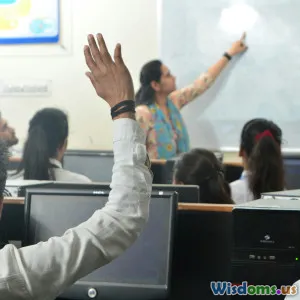
Future Ready Skills: Preparing Students for Tomorrow
6 min read Explore essential skills for students to thrive in a rapidly changing world, ensuring they're prepared for future challenges. (0 Reviews)
Future Ready Skills: Preparing Students for Tomorrow
In the rapidly evolving landscape of the 21st century, the traditional educational model is being challenged. With advancements in technology, shifts in job markets, and the increasing importance of global citizenship, preparing students for a future that may look drastically different from today requires a paradigm shift in education. This article explores the future-ready skills necessary for students to thrive in an ever-changing world and how educators can foster these competencies.
The Importance of Future Ready Skills
Future-ready skills encompass a range of competencies that allow students to adapt to change, solve complex problems, and work effectively in diverse environments. These skills are not just about academic knowledge; they also involve emotional intelligence, social awareness, and practical abilities that are critical for personal and professional success.
Key Competencies for Tomorrow’s Workforce
-
Critical Thinking and Problem Solving
In a world flooded with information, the ability to analyze data, question assumptions, and devise innovative solutions is essential. Students must learn to approach problems methodically, considering multiple perspectives and potential outcomes. -
Collaboration and Teamwork
As workplaces become more interconnected, the ability to collaborate effectively with others is crucial. This involves not only working well in teams but also practicing empathy, communication, and conflict resolution skills that contribute to a positive group dynamic. -
Digital Literacy
As technology permeates all aspects of life, digital literacy has become a fundamental skill. This includes not just the ability to use technology but also understanding how to navigate digital environments safely and ethically. -
Creativity and Innovation
The ability to think creatively and innovate is increasingly valued in various fields. Encouraging students to explore their creativity through project-based learning can stimulate their imagination and help them develop new ideas and solutions. -
Adaptability and Resilience
The capacity to adapt to new situations and bounce back from setbacks is vital in a fast-paced world. Teaching students to embrace change and view challenges as opportunities can foster resilience.
Strategies for Educators
To cultivate these future-ready skills, educators can employ several effective strategies:
1. Integrating Real-World Learning Experiences
Providing students with opportunities to engage in real-world projects can help them apply their learning in meaningful ways. Collaborations with local businesses, community organizations, and internships can enhance their understanding of practical applications and the skills required in the workforce.
2. Emphasizing Project-Based Learning
Project-based learning (PBL) allows students to explore complex questions and problems while working collaboratively. This method encourages them to utilize critical thinking, creativity, and communication skills, preparing them for real-world challenges.
3. Fostering a Growth Mindset
Encouraging a growth mindset—where students view challenges as opportunities to learn rather than obstacles—can empower them to take risks and embrace their learning journey. This mindset can be cultivated through feedback, reflection, and celebrating perseverance.
4. Creating Diverse Learning Environments
Incorporating diverse perspectives and experiences in the classroom can enrich discussions and foster a deeper understanding of complex issues. This prepares students to work in diverse teams and appreciate varied viewpoints.
Conclusion
As we look towards the future, the skills that students acquire today will shape their ability to navigate tomorrow's challenges. By focusing on critical thinking, collaboration, digital literacy, creativity, and adaptability, educators can empower students to become lifelong learners who are prepared for success in a dynamic world. It is essential that we continue to innovate and adapt our educational practices to ensure that every student is equipped with the tools they need to thrive.
Equipping students with these future-ready skills not only prepares them for personal success but also contributes to a more resilient and innovative society. As we embrace the opportunities ahead, let us commit to nurturing the next generation of thinkers, creators, and leaders.
Rate the Post
User Reviews
Popular Posts





















